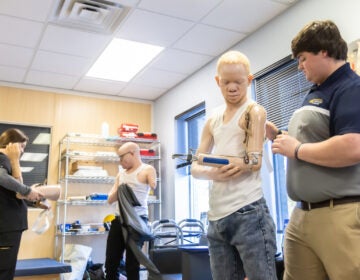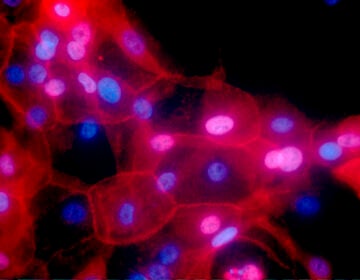Why one man swallowed parasitic worm eggs
Listen
A technician looks at pig whipworm eggs through a microscope in the lab where they are produced and purified. (Photo courtesy of John Fleming, Detlev Goj)
Hint: It offered a slight chance of rebooting his damaged immune system.
About ten years ago, Jim Turk was going to graduate school at the University of Wisconsin Madison, while working full-time, running marathons, and playing drums in a band.
But his life changed dramatically in 2008.
“I could only run for maybe a minute or two before shaking uncontrollably, [I was] not able to turn off my iPod, [and was] losing control of my bladder.”
After several visits to doctors, he was diagnosed with multiple sclerosis or MS – a disease in which the material protecting nerve cells is damaged.
Not long after that, he heard about an unusual clinical trial at the University of Wisconsin Madison, which would involve him gulping down live worm eggs.
“People think it’s swallowing earthworms,” he says, but he really just drank a small paper cup of mildly salty water, with microscopic worm eggs inside.
Turk had worked in science labs, so he didn’t find it too gross to have worms living inside him, but he knew that other people wouldn’t be as eager to sign up for the study. He emailed the researchers and he was the first person to ask about the trial.
During the three-month trial, Turk did a lot of tests, everything from math problems and walking, to MRI scans.
The trial was run by John Fleming, a neurologist at the University of Wisconsin Madison. Fleming says we live in a very clean world, free from a lot of parasites, and sometimes, that can be a bad thing. The immune system can turn on your own body.
“We think that’s the basis for auto-immune diseases like multiple sclerosis,” Fleming says. “For some reason, the immune system attacks the person’s own tissues, in the case of multiple sclerosis, the brain and spinal cord.”
If that hypothesis is true, then maybe adding some parasites back would reset the immune system, like rebooting a computer.
After Jim Turk and four other patients swallowed the worms, Fleming says, “within about 24 hours, the eggs hatch to little, teeny, microscopic worms, and these grow over the course of a couple weeks in the gastrointestinal system, in the colon, to about the size of an eyelash.”
“They sit just on the surface of the lining of the colon, and we know it stimulates the cells of the colon and probably from there into the whole immune system.”
These are pig whipworms, not human parasites, so they can’t live inside humans for too long. That means the Wisconsin patients had to swallow more eggs every two weeks to keep the mild infection going.
Fleming says the researchers had high hopes after one observational study in Argentina, because in that study, “when patients got a parasite, their multiple sclerosis was virtually cured.”
But, the two clinical trials in Wisconsin weren’t that effective.
The latest one studied 16 patients for 10 months.
The results haven’t been published yet, but Fleming says patients who got the worm eggs had 35 percent less brain lesions, or markers of where the disease is active, which he describes as “modest…certainly not a cure for multiple sclerosis at this point.”
This study used pig parasites – and he says the next step in advancing this research might be human parasites. Other ongoing studies already do that, but not everyone is on board with this.
Thomas Leist is a neurologist and MS specialist at Thomas Jefferson University Hospitals.
“Outside of clinical studies, will we actually purposefully infect people with some eggs of worms or worm infections? I don’t think so.”
Leist says using parasites could have unintended consequences, like giving patients an infection somewhere else by mistake.
Rather than making a worm treatment, Leist says researchers will probably study how our immune system reacts to these worms, and see if there’s anything we can learn that might be used to develop something else to treat MS.
Meanwhile, worm research is still going on.
Doctors in New Zealand are going to give parasitic hookworms to patients with celiac disease. This comes after a similar study in Australia, where patients with celiac disease got hookworms, and managed to eat a bowl of spaghetti without the expected reaction of diarrhea, cramps, and throwing up.
Jim Turk, the patient in the Wisconsin trial, now does a lot of public speaking about having MS. He says the worm story is a perfect hook:
“It was a great way to get people’s attention fast, because, again, they have this picture in their head and they think it sounds gross at first.”
Turk now works to get people interested in participating in clinical trials, even if it involves something that might gross them out.
WHYY is your source for fact-based, in-depth journalism and information. As a nonprofit organization, we rely on financial support from readers like you. Please give today.







